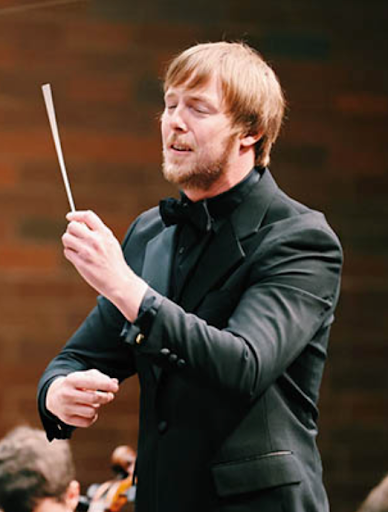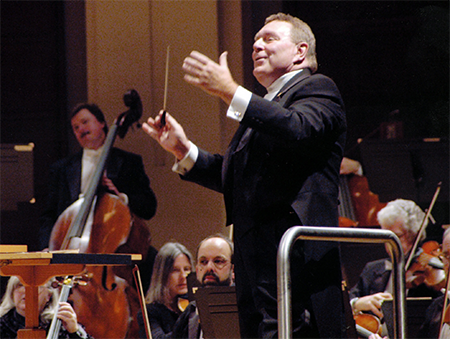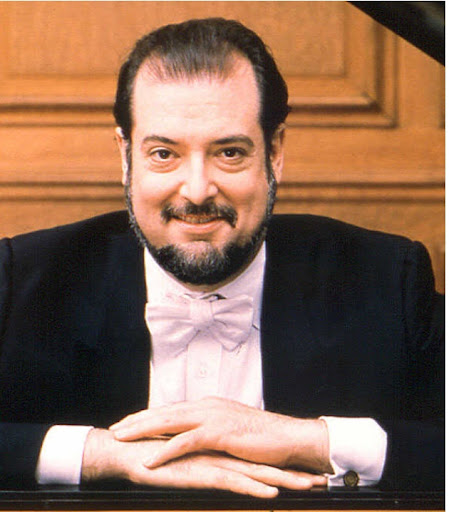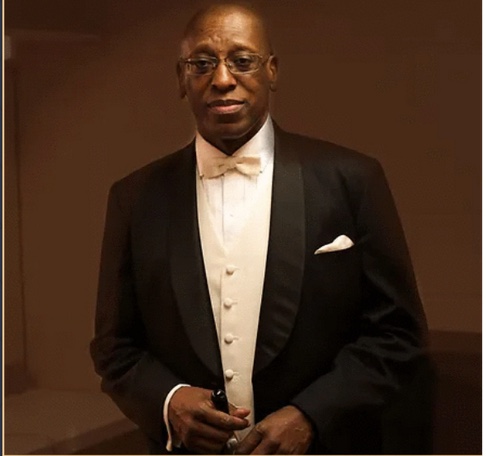by Mike Telin

On Saturday, October 7 at 7:30 pm, the young conductor will lead the Orchestra’s season-opening concert at Zimmermann Symphony Center. The program, titled “Ode to Freedom,” includes Joan Tower’s Made in America, Dmitri Shostakovich’s Symphony No. 5, and two works that will feature Seohyun Kim, winner of the 2022 Thomas and Evon Cooper International Violin Competition: Maurice Ravel’s Tzigane and Jeff Scott’s Song of the Uirapuru, receiving its world premiere. Tickets are available online.
I caught up with Jaroszewicz by phone and began by asking him how he is managing during this period of transition.
Matthew Jenkins Jaroszewicz: It’s been difficult for a lot of reasons. Obviously, in six years serving as Gerhardt’s assistant and then associate, I built a professional and personal relationship with him, and with his wife Sharon as well. The plan was for me to take over as Music Director in 2026, and after that Gerhardt would still be around as the Music Director Emeritus for five more years. So to not only be thrust into the role three years early, but to not have Gerhardt there as someone I could lean on as a mentor was a shock.
Mike Telin: But you are now the caretaker of this coming season.
MJJ: Exactly, although my title is still Music Director Designate. The way I see it is that we’re basically leaving the Music Director chair vacant because this season is about honoring Gerhardt, not about me becoming Music Director. And I want that to be abundantly clear to everybody.
If you look at our season brochure, it’s got a big picture of Gerhardt on the front. The last artistic gift that he left was this season. And to the best of our ability, we are keeping the season exactly as he planned it. The only exception is that he was going to arrange his own suite of music from the ballets and operas of Jean-Philippe Rameau. But he did not get to that before he passed.
MT: It’s a difficult transition but you do have an exciting program coming up next week.
MJJ: Exactly. You and I were sitting together in Warner Hall when Seohyun Kim won the Cooper Violin Competition. And you know I was adamant that she should be the winner. And I was over the moon that the jury agreed.
I am excited to get to work with her, and Jeff Scott’s piece is a wonderful addition to the 21st-century tonal American sound. It’s more of a piece for violin and orchestra rather than a violin concerto. And it has a big orchestra with lots of percussion. So I’m honored to give the premiere.
And it’s still surreal that I get to conduct Shostakovich 5. It’s a piece I’ve known for a long time, and to get to conduct it is just remarkable.
MT: Let’s stick with the Masterworks series: tell me about “Baroque Bash” on November 11.
MJJ: Kelly Corcoran will be conducting this concert. She’s a former assistant conductor here in Canton who is now based in Nashville. The idea for the season is that we wanted to honor Gerhardt by having guest conductors he influenced.
The concert features Julie Johnson Sarver who has played flute and piccolo with the Orchestra since 1987. She’s one of the longest-serving members and this will be her first time as a soloist. She’s playing a Vivaldi piccolo concerto.
We try to feature a piece written by a woman or a person of color on every program. Here we have Mariana Martinez, a Classical era composer Gerhardt discovered who was an acquaintance of Mozart and Haydn. Not all of her music survives. The piece we’re playing is called Overture, but the title is a bit of a misnomer because it’s a three-movement work that’s more like a mini symphony.
MT: The January 20 concert, “Celtic Celebrations,” includes Amy Beach’s Gaelic Symphony.
MJJ: I programmed this concert because I was already scheduled to conduct it. Gaelic Symphony was the first symphony ever composed by an American woman, and I chose the Mendelssohn Scottish Symphony to pair with it because both pieces are inspired by the sights and sounds of Scotland. And in the case of the Beach, she took actual folk melodies from both Ireland and Scotland and incorporated them into the piece.
The Beach was a COVID discovery. I made it my mission to listen to as much rep that I didn’t know — not only a lot of music by women and composers of color, but also any lesser-known music that should be better-known. And her symphony was one that I came across. There’s a wonderful recording with Neeme Järvi and the Detroit Symphony which I got to know very well. And I thought, ‘This is a cool piece.’
MT: And the “Romantic Afternoon” with pianist Garrick Ohlsson on February 18.
MJJ: I’m not going to lie, I am a little bit nervous for that one because Ohlsson is a god among men in this profession. Of course he worked with Gerhardt and Canton before, so they had a professional relationship. But with Gerhardt’s passing, he confirmed that he would still be honored to come and play — and now play in Gerhardt’s memory.
He’s playing Rachmaninoff’s Third Piano Concerto, which is a fiendishly difficult work. It’s really quite an honor for me to conduct that piece with him as the soloist.
MT: And there’s the Mozart Requiem on March 23.
MJJ: Yes, and Stefan Sanders is conducting that concert. He was a student of Gerhardt’s at the University of Texas at Austin and has gone on to have a great career.
MT: Who are the soloists?
MJJ: Rachel Hagemeier, the Orchestra’s president, really wanted us to showcase Northeast Ohio talent, so the mezzo, Kira McGirr, and the baritone, Edward Vogel, are both colleagues of mine in the Trinity Cathedral Choir. And the soprano is Amanda Powell, another local who will be appearing with us twice this year — she’s coming back with her group Alla Boara for the Divergent Sounds Series.
The tenor, John Pickle, was a favorite of Gerhardt. He was a soloist the last time we did Beethoven 9, in the spring of 2022.
MT: And there’s a Family Concert on April 13.
MJJ: We’re calling it “For the Family.” It’s going to be a matinee and all of the tickets are going to be available at a reduced price. It’s also a shorter concert with shorter pieces.
One interesting thing is that we’re playing Ina Boyle’s Overture for Orchestra, which I discovered earlier this year and really love. It’s in the spirit of Vaughan Williams. It was very difficult to get ahold of the score and parts, which made me think, ‘Has this piece ever been performed in the United States?’ So I emailed the Ina Boyle Society, and sure enough, this will be the American premiere — a 90-year-old piece of music, and we’re giving the American premiere.
MT: The series concludes with “Rhapsodies from Bohemia” on April 27.
MJJ: Honestly, I am over the moon about getting to conduct Mahler 1. Obviously it’s very intimidating, but once I started studying the score I thought, it’s just great music. It’s a glorious piece, and the fact that he wrote it in his late 20s is so hard to believe.
MT: How involved are you with the Orchestra’s other series?
MJJ: I’m conducting all of the Pops concerts as well. I think it speaks volumes to the community when the music director is conducting the pops. It shows that the orchestra really cares about that audience as an integral part of their fan base. And moreover, I’ve had a good time.
The Divergent Sounds is coming back and we’re going to do it at the Auricle, which is a live music venue in downtown Canton. We did one concert there last season, and it was such a hit and such a mutually beneficial partnership that we’re doing the whole series there this year.
And we have “Gospel Joins Symphony” on June 15. I’m going to be sharing the stage with Dr. Henry Panion, whose specialty is performing gospel concerts with symphony orchestras. He brings his expertise and knowledge of this repertoire to his work with the symphony, and also his expertise in working with gospel musicians, many of whom don’t read music, but nonetheless can be taught to sing quite complex arrangements.
MT: I see this is in partnership with EN-RICH-MENT of Stark County.
MJJ: It’s a really remarkable organization — they’ve got a drum line, a gospel choir, and they work with people on gospel solo material as well. And it’s all for youths, so they are going to be performing with the chorus. Their founder and director, Betty Smith, has been integral in helping us plan the whole program as well. She’s been in on all the meetings, and had a lot of input during the planning process. She’s just a remarkable woman.
MT: Are you still conducting the Youth Symphony?
MJJ: I’m still conducting the Advanced Orchestra, but not the Intermediate Group. We had already decided that I would give that up for this season. But it is my intention to keep the Advanced Orchestra for as long as I can. I love conducting them so much. They bring such joy to music-making. And it reminds me of just how magical it is to be in the orchestra world.
MT: Matthew, thanks for spending so much time talking about all of this. Is there anything else you would like to add?
MJJ: Just that I am still so humbled and honored. It’s still kind of hard to believe, both the fact that Gerhardt has passed, and that the board of the Symphony appreciated the work I had done over the past five years and wished to name me as Gerhardt’s successor.
And I’m here to do my best for this orchestra and this community. I miss Gerhardt, and I truly wish that he had been able to finish his term as Music Director. But I am here to give it everything I have.
Published on ClevelandClassical.com October 3, 2023.
Click here for a printable copy of this article






